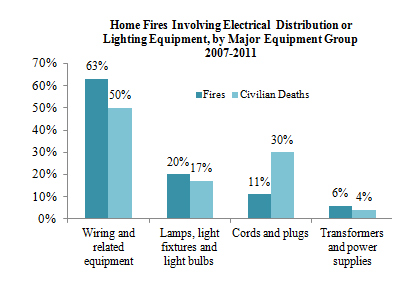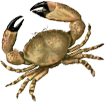Letter From the Chief-Electrical Safety Month
Wednesday, May 21, 2014
 From the NFPA-specific causes of home electrical fires 2007-2011 From the NFPA-specific causes of home electrical fires 2007-2011
Every year, fire departments in the U.S. respond to over 45,000 fires that were caused by electrical failures. According to the Electrical Safety Foundation, these fires resulted in 455 civilian deaths, 1,518 civilian injuries and $1.5 billion in direct property damage from 2007-2011, and most could have been avoided. And fire is not the only concern. Every year over 300 people are electrocuted, while thousands more experience nonfatal electrical shock and burn injuries. Here are some thoughts to keep you safe:
Inside the house:
.Your service panel is the hub for all the electric current running through your home. Make sure it's not blocked by those boxes of Christmas decorations and be sure the MAIN circuit breaker (the one that shuts off the entire house at once) works properly. In an emergency, you or the fire department may need to shut down the power quickly.
.If an outlet or switch in your home feels warm or is buzzing, something's very wrong. DO NOT ignore this situation. Again, hot circuits cause fires. Call a licensed electrician.
.Extension cords are intended only for TEMPORARY use. Do not use an extension cord as a permanent solution. Again, if it's too thin, it may overheat.
.Don't plug too many items into any one circuit. And remember, several outlets may be on the same circuit. For example; if three outlets are on the same circuit and you plug an electric heater into one, a hair drier into another and a vacuum cleaner into the third, you're probably trying to get too many amps from that one line which will either trip the breaker/fuse or overheat the wires within your walls.
.NEVER throw water on an electrical fire no matter how small a fire.
Outside the house:
.Don't use electrical equipment in damp or wet locations.
.Use ground fault circuit interrupters (GFCIs) in outdoor areas to reduce the risk of shock.
.Assume that all overhead wires are energized at lethal voltages. Never assume that a wire is safe to touch even if it is down or appears to be insulated.
.Never touch a fallen overhead power line. Call the electric utility company to report fallen electrical lines.
.Stay at least 10 feet away from overhead wires during cleanup and other activities. If working at heights or handling long objects, survey the area before starting work for the presence of overhead wires. Be cautious when Caution using aluminum ladders and electrically conductive tools near or around electrical service entrance conductors.
.If an overhead wire falls across your vehicle while you are driving, stay inside the vehicle and continue to drive away from the line. If the engine stalls, do not leave your vehicle. Warn people not to touch the vehicle or the wire. Call or ask someone to call the local electric utility company and emergency services.
The National Fire Protection Agency (NFPA) reminds us that it's best to call a licensed electrician or your landlord if you have any electrical problems. If you have an electrical fire, call the Fire Department; don't risk your safety to try to put it out yourself!
Stay Safe!
Dan McConnell
Chief of Department
|
 |
|



|
|
CALENDAR OF EVENTS
|
<< | Wednesday, January 21, 2026 | >> |
|
|
|
|
|
|
QUESTIONS FOR THE CHIEF? |
| The Chief is always available to answer any Halesite FD and saftey questions...click here. |
|
|
|
|
|
JOIN OUR EMAIL NEWSLETTER |
|
|
|
| Receive important notices about fire safety, upcoming events, and other important information about the Halesite Fire Department. |
|
|